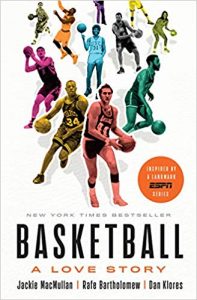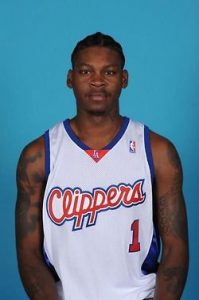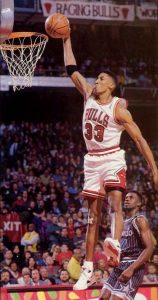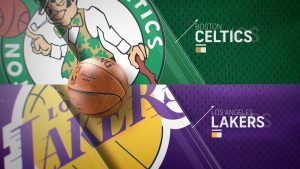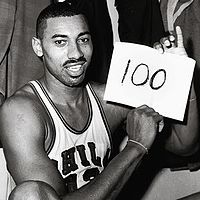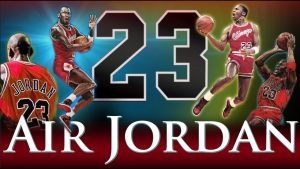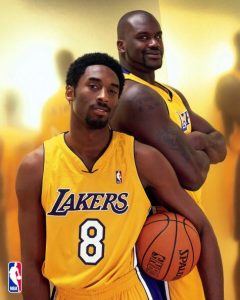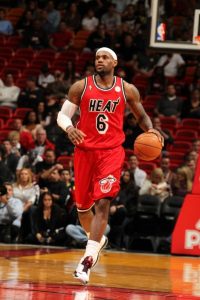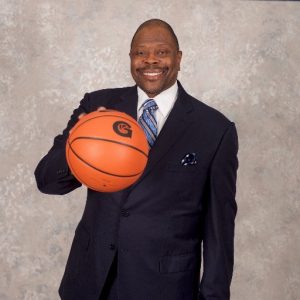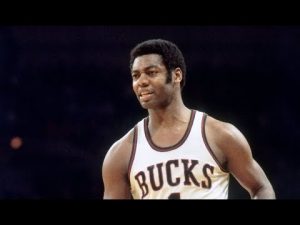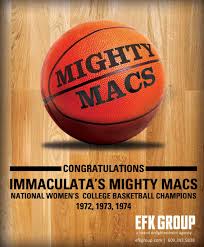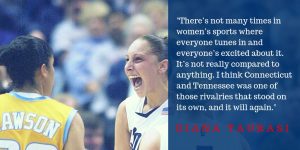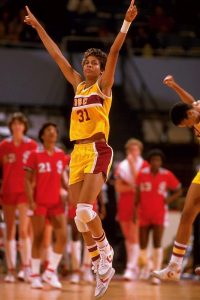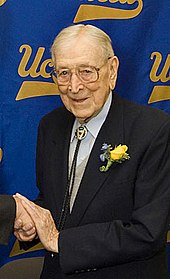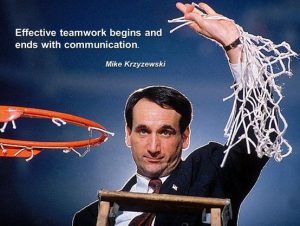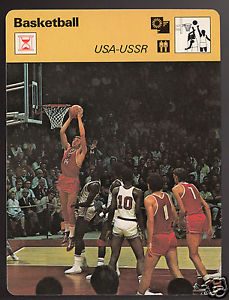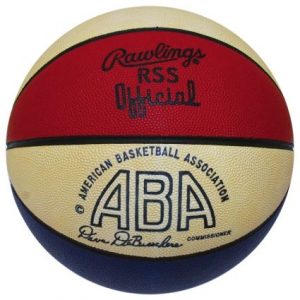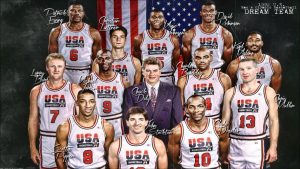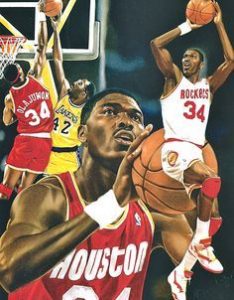Last September ESPN announced that it would be airing a 20-hour/10-part documentary called “Basketball: A Love Story” from Peabody Award-winning director Dan Klores. The project consists of 60+ interconnected “short stories” featuring 165 exclusive interviews with tons of current/future Hall of Famers including Larry Bird/Kobe Bryant/LeBron James/Bill Russell/etc. In addition to the TV documentary, this oral history of basketball was transformed into a written history via Klores and a pair of acclaimed journalists in Jackie MacMullan/Rafe Bartholomew. Mr. Bartholomew, who previously served as features editor at Grantland, has twice been included in the Best American Sports Writing series. HoopsHD’s Jon Teitel got to chat with him about the project itself and many of the college/pro basketball legends who are featured within its pages.
How did the book come together, and how does it compare to the TV series? The book began with Dan Klores’ film, which he began conducting interviews for in 2014. During that process he realized that he was gathering so much rich material that there would be enough to make into an oral history book in addition to the film. He reached out to Jackie MacMullan and myself in early-2016 and we began the process of reading through the transcripts, finding the most vital material, and distilling it into an oral history book.
If it is truly a “love story” then why does it contain some less-than-lovely stories (gambling incidents, racial discrimination, etc.)? I think that the people interviewed for the book and film provide the strongest responses to that with their words. Yes, they have encountered some of the ugliest aspects of humanity during their basketball lives, but the sport still serves as a refuge for them as something that brings them joy/helps them find meaning. I think that is true of nearly everyone who loves the game, whether you are an all-time great or just a weekend warrior.
What is your 1st memory of playing basketball, and how did you 1st fall in love with the game? I first played basketball at the Carmine Street recreation center in lower Manhattan. I remember my dad teaching me to box out because he had led his high school/college teams in rebounding. I remember my coach telling me to aim for the box when I first shot a layup. I probably fell all the way in love a year or two after that, when I got added to a local travel team and got to play alongside some really talented kids, including former NBA guard Smush Parker.
Who is your own all-time basketball hero? Scottie Pippen
What makes basketball different from other sports? Although basketball is the sport I love the most, I kind of resist the inclination to rank and compare sports against each other. The “whose sport is superior” argument often boils down to where a person grew up, what sports were popular in his or her neighborhood, what sports his or her parents loved the most, etc. Basketball did it for me and it means more to me than almost anything else, but if I happened to be from some other city/state/country then it could be hockey/football/baseball/soccer/wrestling: who knows?
How did the Celtics-Lakers rivalry of the 1960s compare to the 1980s version, and how on earth were the 1972 Lakers only able to win a title AFTER Elgin Baylor retired due to injury? At least according to the way Jerry West and others remember it in the book, Baylor’s retirement came after injuries had taken a serious toll on his game and the stars finally aligned for the Lakers. They had so many close calls and bad bounces in earlier years, with series that went 7 games and were decided by a just a make on one end and a miss on the other.
Do you think that Wilt Chamberlain would have been able to score 100 PTS without attempting 32 underhanded FTs, and do you think that anyone will ever seriously approach (forget about breaking!) his record? Kobe’s 81-PT game (against Toronto in January 2006) and that December 2005 game against Dallas where he had 62 through 3 quarters (before sitting out the 4th quarter) make me think that Wilt’s record can be approached. Of course, teams are more careful about playing guys too many minutes in today’s NBA so someone would almost have to make a concerted effort to get there. However, with the way that we see a new generation of players capable of making more difficult 3-point shots at rates higher than we were used to seeing a decade ago, getting to 100 could be easier than it was in the past.
What is your most vivid memory of Michael Jordan on the court, and what is your most vivid memory of Jordan off the court? On the court it is probably that late-career, unstoppable turnaround jumper on the baseline. Off the court it has to be him cradling the Larry O’Brien Trophy after winning the 1991 NBA Finals.
Why could Shaq and Kobe not get along despite winning 3 straight titles with the Lakers from 2000-2002, and do you believe Kobe when he says, “I would try to bring the best out of him every single day”? Their approaches to winning basketball were so different. Kobe probably believes that statement…but in all likelihood his leadership style was not the best way to motivate Shaq.
Do you agree with Doug Moe’s thought that LeBron James left Miami because he did not believe that he could beat San Antonio, and what will his legacy be once he finally retires? I think that was certainly part of James’ decision to return to Cleveland. More so than being able to beat the Spurs, however, I think he saw that Miami’s roster was aging and that the Heat did not have an easy way of rebuilding on the fly, so he created a situation in Cleveland where he would have a better chance to win. I think that his legacy will be as the greatest player of his generation.
How were so many African-American basketball stars able to deal with the racism of the 1950s/1960s, and what is your reaction to Patrick Ewing’s statement that, ”there’s still racism today…everywhere”? I agree with Ewing: I think those players dealt with discrimination in the same kind of courageous and dignified manner that we see people all over the world today facing injustice with.
How did Oscar Robertson’s 1970 antitrust lawsuit change the NBA landscape that we see almost a half century later, and were it not for Oscar would we have reached the current era of “treating basketball players like movie stars”? It created free agency so it got the ball rolling for all the transactions and player movement that drive NBA media/talk today. More importantly, it empowered NBA players to take greater control over their own careers.
How big a deal were the gambling scandals of 1954/1961, and is there a fear that legalized sports betting will allow these nefarious elements to make a return to the sport? Those scandals were big enough deals to change the history of NCAA basketball. I do wonder if the NBA’s embrace of legalized sports betting may have more negative effects on the league’s product than its leadership anticipates. I have spent a lot of my career reporting on Philippine basketball: gambling has always been a central part of the culture around their professional and collegiate leagues, and even when there is no evidence of game-fixing or point-shaving the players are commonly accused by fans of selling games.
Will we ever see a tiny school like Immaculata College ever win a national title again (much less 3 in a row)? I do not think that is possible with the way that big-time college sports operate today.
What made the Connecticut-Tennessee rivalry so special, and how excited were you to learn that it will be renewed next season after being canceled for more than a decade? I think it is great for the women’s game that the rivalry will resume. It is also wonderful that in the years that Tennessee and UConn did not play each other, the sport continued to grow and thrive beyond 1 marquee rivalry.
Do you think that Cheryl Miller would have become the greatest women’s player ever if she had remained healthy, and what does she mean when she says, “there were different rules for men and women”? I believe she was referring to the double standards female athletes encountered in her time and still encounter today.
Where would the WNBA be without David Stern, and will WNBA salaries ever become competitive with overseas salaries in Russia/China/etc.? According to the people who helped get the WNBA off the ground, Stern acted as a true champion for the league, really pushed for its creation, and would not accept facile criticism from mostly male sportswriters. I think that WNBA salaries will eventually become comparable with overseas money, but first the WNBA would probably have to abandon its summer league format and follow a schedule more akin to the traditional season of basketball as a cold-weather sport with a longer season.
What made John Wooden the most successful men’s college coach ever, and how could he not know what booster Sam Gilbert was doing behind the scenes if Larry Brown says there was “no question” that Gilbert was involved? According to the people interviewed in the book, Wooden was aware of Gilbert and had suspicions about his activity, but his bosses at the UCLA athletics department told him to worry about coaching and let them handle the rest. We can choose to hold that kind of looking the other way against Wooden’s legacy if we like.
If a coach does not have a championship on his resume, can he still be considered an all-time great? Yes, especially in the college game, where the tournament format is so chaotic and where great teams can be upset after just 1 off-night. Long-term success is a good enough criterion for me.
How did UNC become a national power, and how close was Christian Laettner to becoming a Tar Heel knowing that his mom said, “I love Dean Smith”? Coaches Frank McGuire/Dean Smith built UNC into a blueblood program with remarkably tight bonds between former players over several generations. Laettner’s mom said that because Smith was such an inspiring figure and persuasive recruiter.
How was Mike Krzyzewski able to translate his success at Duke to success with the US Olympic team, and where does he rank among the greatest basketball coaches ever? He ranks as 1 of the best and deserves a lot of credit for helping restore USA Basketball to glory after the 2004 Olympics, even though many fans would look at the rosters of US Olympic teams and feel like anyone could coach those all-star lineups to gold medals.
How on earth did the US lose the 1972 Olympic gold medal game, and do you think that team USA will ever lose another gold medal game in our lifetime? I think it is likely that the USA will be upset again. There are always 2-3 teams in the Olympic basketball field who have an outside chance at beating Team USA if they catch them on the right night.
The longest chapter of the book is about the ABA, which is now fondly remembered as a series of hilarious anecdotes: what is your favorite 1? That when the league did not have its trademark red/white/blue ball ready for the first ABA preseason games, they tried painting the balls instead…and then the paint started running off the balls in the middle of games once it got mixed with the players’ sweat!
Do you agree with Marv Alberts’ assessment that the 1992 Dream Team was “the greatest team in the history of sports”? Yes, although it is impossible to prove.
Who is the best international player ever, and who is the most important international player ever? The most important is Arvydas Sabonis: I believe that if he had gotten the chance to begin his NBA career earlier, he would probably also be the best international player ever. If we are factoring in NBA careers, I believe Hakeem Olajuwon is the greatest international player ever.

